目录
- string
- string类的常见构造
- string容量相关接口 (size(),capacity(),clear(),empty)
- resize()接口函数
- reserve()
- string类对象的访问及遍历操作
- string类对象的修改和操作
- 插入(拼接)方式
- 正向和反向查找:find() + rfind()
- 截取子串:substr()
- getline()
- reverse用法
string
string时表示字符串的字符类
//使用 string类包含#include 头文件 以及 using namespace std
string类的常见构造
#include <IOStream>
#include <string>
using namespace std;
int main()
{
string s;//string()
string s1("hello world");//string(const char* s)
string s2(s1);//string(const string& s)
cout << s << endl;
co编程客栈ut << s1 << endl;
cout << s2 << endl;
return 0;
}
string容量相关接口 (size(),capacity(),clear(),empty)
1.size()是元素个数
//. size()与length()方法底层实现原理完全相同,引入size()的原因是为了与其他容器的接口保持一致,一般情况下基本都是用size()。2.capacity()是容积3.clear()将字符串清空,但不改变底层空间大小 //clear()只是将string中有效字符清空,不改变底层空间大小。4.empty()检测字符串是否为空是返回true ,否则返回false
resize()接口函数
resize(size_t n) 与 resize(size_t n, char
c)都是将字符串中有效字符个数改变到n个,不同的是当字符个数增多时:resize(n)用0来填充多出的元素空间,resize(size_t n, charc)用字符c来填充多出的元素空间。注意:resize在改变元素个数时,如果是将元素个数增多,可能会改变底层容量的大小,如果是将元素个数减少,底层空间总大小不变。
int main()
{
string s1("hello world");
cout << s1.size() <<endl;
cout << s1.capacity() << endl;
s1.resize(34,'y');// 将s1中有效字符个数增加到34个,多出位置用'y'进行填充
s1.resize(13);
cout << s1.size() << endl;
cout << s1.capacity() << endl;
cout << s1 << endl;
s1.resize(3, 'y');
cout << s1.size() << endl;
cout << s1.capacity() << endl;
cout << s1 << endl;
return 0;
}
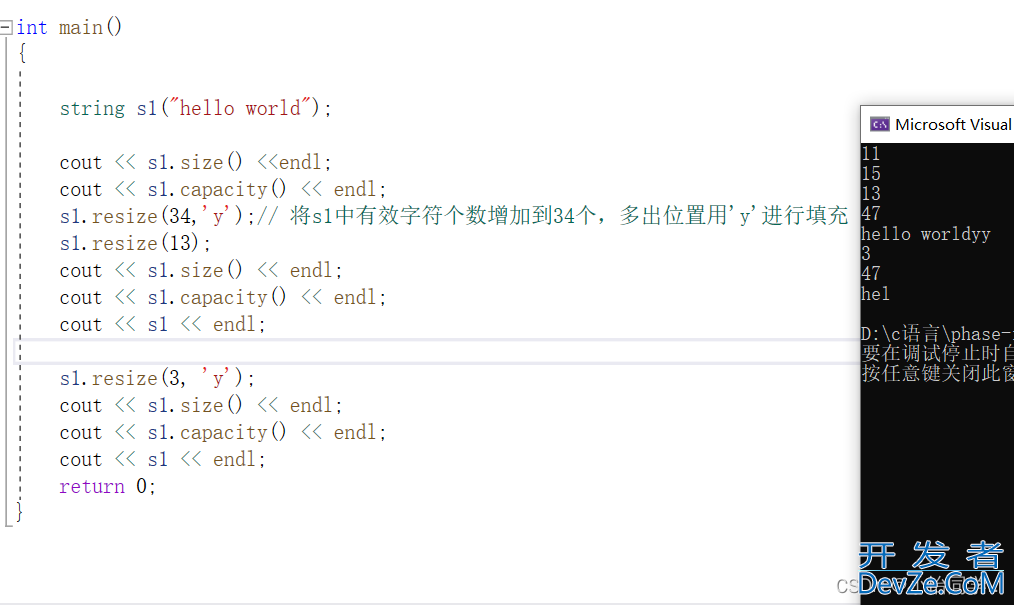
reserve()
//reserve(size_t res_arg=0)
为string预留空间,不改变有效元素个数,当reserve的参数小于string的底层空间总大小时,reserver不会改变容量大小。
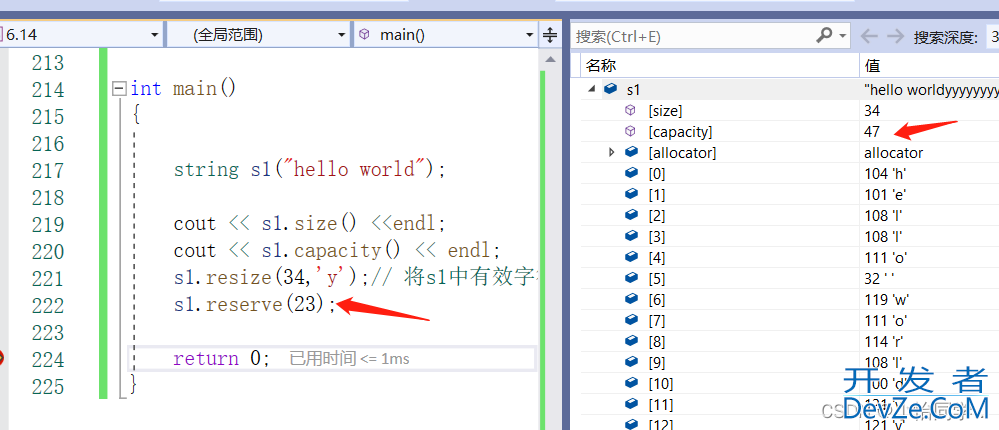
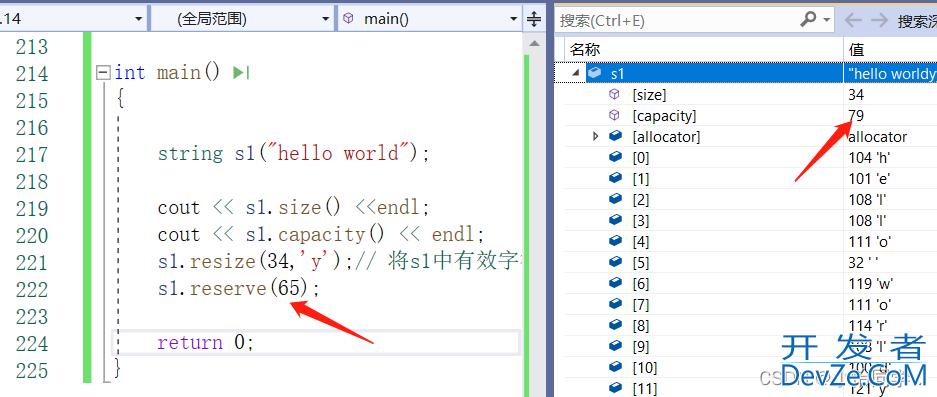
string类对象的访问及遍历操作
//operator[]
//迭代器->begin(),end() / rbegin() ,rend()//for
1.operator[]
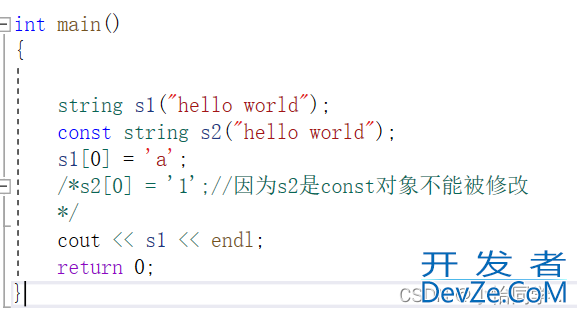
2.迭代器
int main()js
{
string s1("hello world");
string::iterator vit = s1.begin();
while (vit != s1.end())
{
cout << *vit ;
vit++;
}
cout << " " << endl;
string::reverse_iterator it = s1.rbegin();
while (it != s1.rend())
{
cout << *it;
it++;
}
return 0;
}
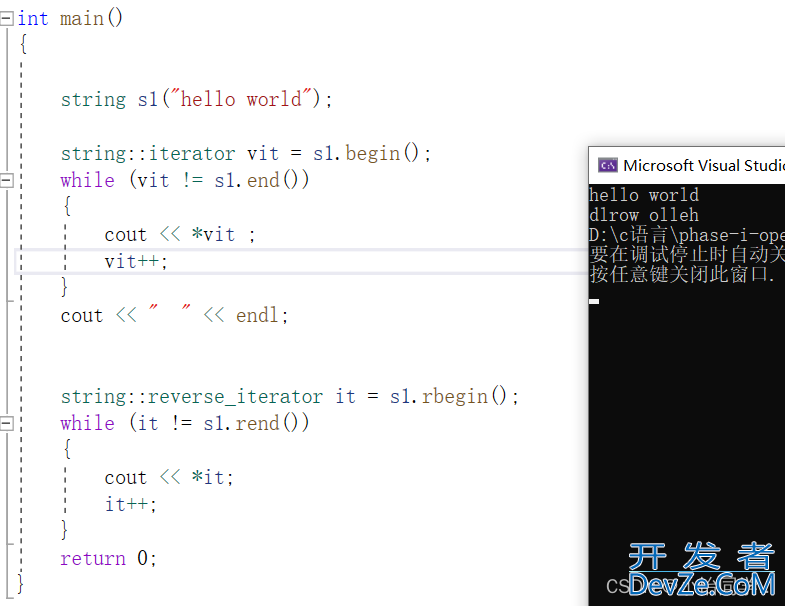
3.范围for
int main()
{
string s1("hello world");
for (auto tmp: s1)//tmp只是原数组拷贝 不改变原数就改成引用会改变
{
cout << ++tmp;
}
cout << " " << endl;
for (auto& tmp : s1)
{
cout << ++tmp ;
}
return 0;
}
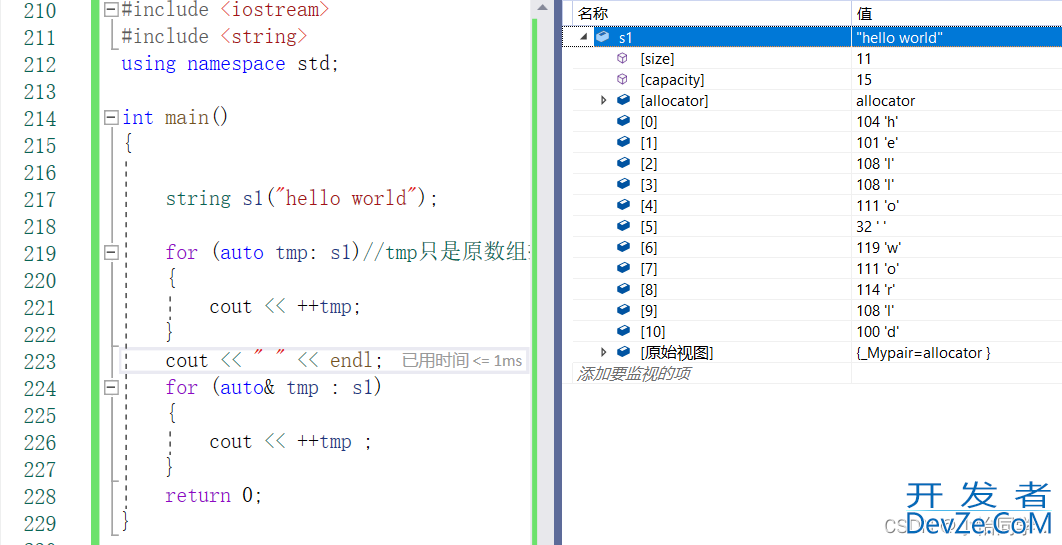
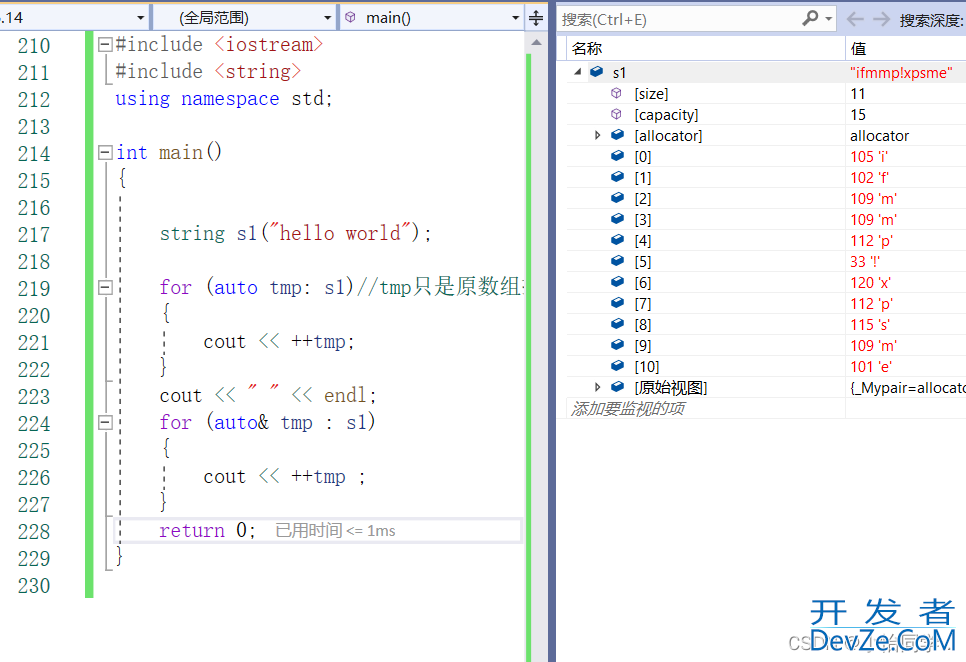
string类对象的修改和操作
插入(拼接)方式
push_back() //加字符
append()//加字符串operator()//加字符或字符串都行
int main()
{
string s1("hello world");
s1.push_back('a');
s1.append("asddfs");
s1 += 'a';
s1 += "sfasd";
cout << s1;
return 0;
}
正向和反向查找:find() + rfind()
int main()
{
string s1("hello.world");
int pos1 = s1.find('.');
string s ("string.cpp");
int pos = s.rfind('.');
string s2("aahello.world");
int pos = s2.find(s1);//查找字符串
//返回下标
string s1("hello.worl.d");
int pos = s1.find('.',6 );
//第一个参数是要编程找的字符、字符串,第二个参数是从下标n开始查找
cout << pos;
return 0;
// npos是string里面的一个静态成员变量
// static const size_t npos = -1;
//如果未找到匹配项,则该函数返回string::npos。
}
截取子串:substr()
string substr (size_t pos = 0, size_t len = npos) const
int main()
{
string s1("hello.world");
int pos1 =编程 s1.find('.');
string s2("aahello.worl编程客栈d");
string s3( s1.substr(1, 5));
cout << s3 << endl;
//从下标pos ,截取n个
return 0;
//返回字符串对象
}
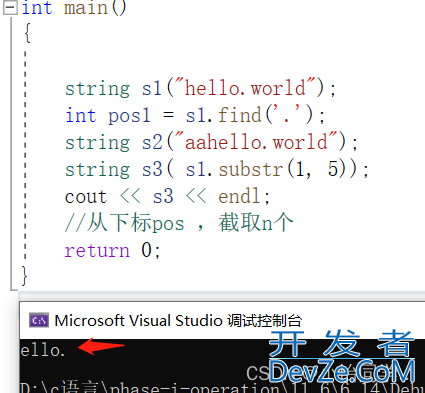
getline()
//非字符类的接口函数
istream& getline (istream& is, string& str)
int main()
{
string s1;
getline(cin,s1);
cout << s1 << endl;
return 0;
}
reverse用法
//非string接口函数,常用于字符串反转 void reverse (BidirectionalIterator first,BidirectionalIterator last); 参数是迭代器 (左闭右开)
#include <iostream>
#include <string>
using namespace std;
int main()
{
string s ("race a car");
reverse(s.begin(), s.end());
cout << s << endl;
return 0;
}
//begin()是字符串第一个字符
//end()是字符串最后一个字符的下一位//rbegin()是最后一个元素//rend()是第一个元素
到此这篇关于C++中String类的常用接口函数的文章就介绍到这了,更多相关C++ String类内容请搜索我们以前的文章或继续浏览下面的相关文章希望大家以后多多支持我们!






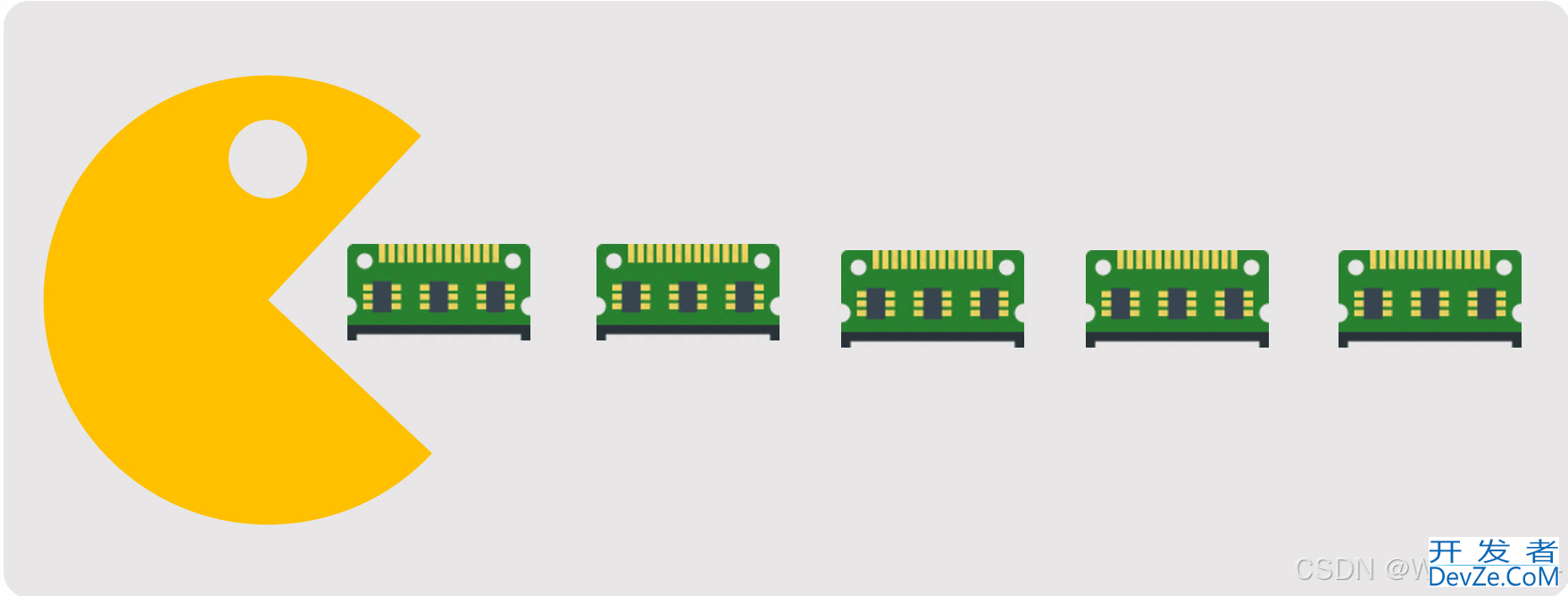

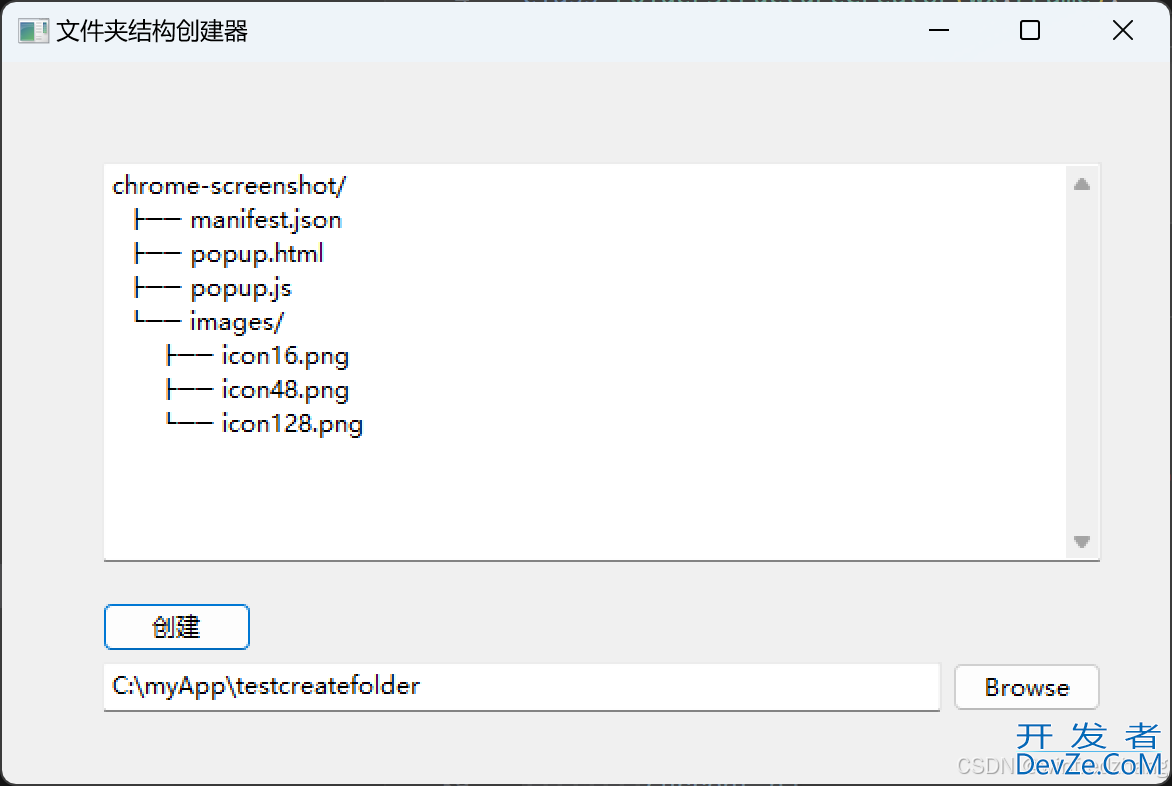
 加载中,请稍侯......
加载中,请稍侯......
精彩评论